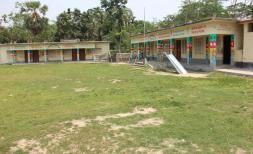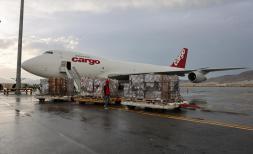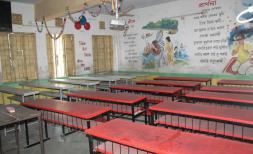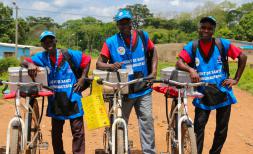International community failing Afghanistan during major locust outbreak as 8 million people cut off from food aid
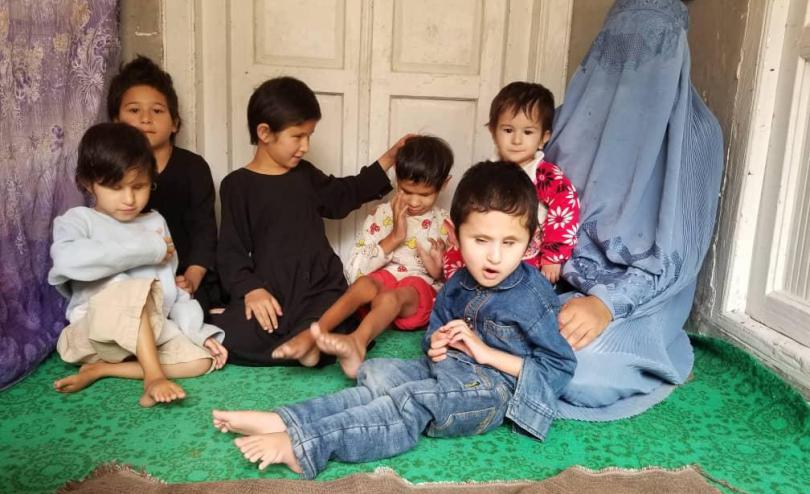
Shabana* with her children. Sometimes she and her husband are forced to skip meals due to food shortages. Photo by Shaima Al-Obaidi/Save the Children. More content available here
KABUL, Afghanistan 19 June 2023 — A large-scale plague of locusts is ravaging Afghanistan’s northern provinces, as eight million people have been cut off food aid in the past two months due to funding shortfalls. The escalating situation threatens to plunge millions of people into worsening levels of hunger, Save the Children said.
The locust outbreak has come at the worst possible time for the people of Afghanistan, where some 15.3 million people – one-third of the population – are projected to face crisis levels of hunger over the next five months, including 3.2 million children. The outbreak of the Moroccan Locust, one of the world’s most damaging plant pests, has affected eight of Afghanistan’s 34 provinces.
The locusts have the potential to destroy 1.2 million tons of wheat, approximately one-quarter of the country's annual harvest at a cost of $480 million.
Without an urgent injection of funding, the country could spiral into famine-like conditions. Aid organisations are facing a $2.2 billion shortfall in humanitarian funding to support Afghanistan's most vulnerable children and families, especially women and girls.
The international community must increase humanitarian aid and resume development assistance to the Afghan people.
The legacy of decades of conflict, a third consecutive year of drought, the international community’s suspension of development assistance and imposition of sanctions since August 2021, and a worsening economy, are contributing to the suffering of the Afghan people.
Shabana*, 28, and her husband are struggling to make ends meet for their six children, five of whom are blind. Some days they survive on plain rice while they are often forced to skip meals altogether.
Shabana* said: " I worry about my children and have anxiety about where or how we will get our next meal" It’s really hard to take care of my children’s needs because five of them are blind. They have severe disabilities and I struggle to cope."
“I can’t see a way forward. I feel trapped. When there is no work for my husband, then my children go hungry. I feel helpless and I have no hope that things will change, but I stay strong because my children need me,"
Save the Children Country Director in Afghanistan, Arshad Malik, said: “The international community owes a debt and has a moral obligation to support Afghan children, women, and families at this dire time. Children are the most affected by this crisis and millions will suffer unless humanitarian assistance is immediately increased.
“However, humanitarian aid alone is not a quick fix. The underlying drivers of hunger including resuming development aid and support to the country’s ailing economy will also need to be addressed.”
Save the Children has worked in Afghanistan since 1976, including during periods of conflict, regime change, and natural disasters. It has programs in nine provinces and works with partners in an additional six provinces.
Since the Taliban regained control in August 2021, Save the Children has been scaling up its response to support the increasing number of children in need. Save the Children delivers health, nutrition, education, child protection, shelter, water, sanitation and hygiene, and food security and livelihood support. Since September 2021, Save the Children has reached more than 4 million people, including 2.1 million children.
ENDS
Notes to Editors:
- You can find a full content package of Shabana and her family here
- In May, WFP cut 4 million people from its emergency food assistance for the second month in a row due to severe funding constraints. Since the beginning of April 2023, 8 million people have not received assistance due to persistent funding shortfalls.
https://reliefweb.int/report/afghanistan/wfp-afghanistan-situation-report-24-may-2023
For more information please contact:
- Emily Wight, Global Media Manager, Emily.Wight@savethechildren.org;
- Diana Oberoi, Regional Media Manager for Asia (based in Bangkok), Diana.Oberoi@savethechildren.org;
- Our media out of hours (BST) contact is media@savethechildren.org.uk / +44(0)7831 650409

